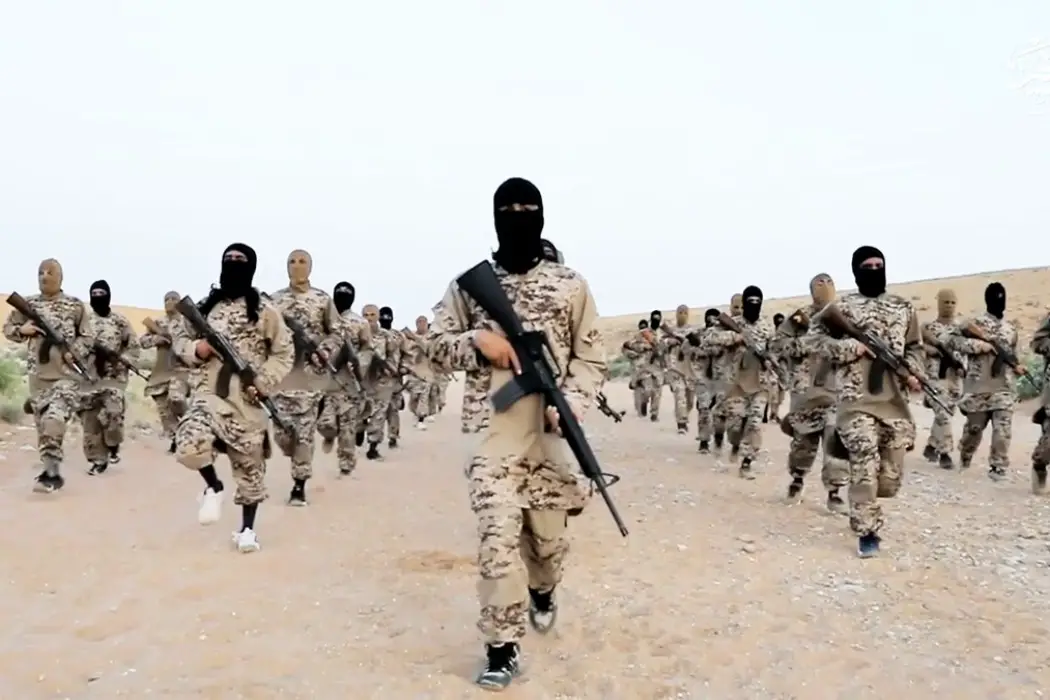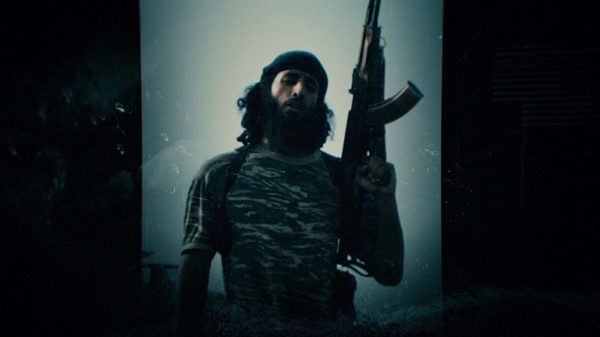UNMASKING JIHADI JOHN: Botched Exploration Of Radicalization

Kaitrin Tobin is a Boston based film enthusiast and Paul…
Unmasking Jihadi John: Anatomy of a Terrorist opens with a horrifying video of an ISIS execution with an audio track playing above a man seemingly chuckling to himself. The video and audio are at odds with each other, with the cheery voice contrasting the stomach churning video. Unmasking Jihadi John aspires to show how an ordinary British teen became radicalized to become the face of ISIS.
While deeply moving in certain sections and somewhat educational, the documentary is at odds with itself as it weakly attempts to explain the radicalization of Mohammed Emwazi while explaining the entire history of ISIS, something that cannot be simplified into a 97 minute documentary, making it an admirable but ultimately failed attempt to address either topic.
Uneven Portrait of a Troubled Youth
The documentary begins strong, as director Anthony Wonke dives into Emwazi’s background and his formative years. Details such as Emwazi’s love of football and S Club 7 help to paint a picture of a teen who appeared normal but in retrospect should have set off many red flags. The inclusion of Emwazi’s former teacher makes for an especially compelling section, as she describes Emwazi’s awkward social skills and self isolating tendencies, concluding with the chilling warning “he was one of those invisible young people that we assume everything’s ok”.

The documentary begins to lose it’s grip once Wonke begins to extrapolate about what radicalized Emwazi. A rotation of talking heads theorize that his radicalization came from his teenage years as well as some criminal activity, but there is no solid insight into his views, other than the statement that when he was at university, he began to catch the attention of authorities for having potentially radical views. The lack of insight into Emwazi’s mindset or beliefs seem partly an issue of logistics (none of his family, friends, or schoolmates are ever interviewed) but the superficial explanation of Emwazi’s descent into ISIS is a serious hindrance to the film which becomes more obvious throughout the documentary.
A Rushed History of ISIS
While it’s obvious that in order to understand Emwazi you must have a background on ISIS, the film stumbles in its explanation of ISIS, giving viewers a crash course in ISIS and the War on Terror. The background on ISIS is fascinating, and more than likely a good portion of viewers will learn about the origins and how the leaders ascended to power. It’s impossible to summarize how ISIS amassed so much power so quickly in 97 minutes while still offering insight into Emwazi and his radicalization.

The introduction to ISIS and it’s leader (Al Baghdadi) and his radicalization at a US detainment camp is informative and important to understanding how the group gave rise to Jihadi John and other disenfranchised members of society who felt connected to the message that ISIS was propagating. However, the background on ISIS and Al Baghdadi brings up more questions than answers (how did Al Baghdadi end up in the US detainment camp? What circumstances led to Al Qaeda member Al Zarqawi becoming his mentor?) All of these questions are worthy of exploration, but the limited runtime combined with the alternating focus between the history of ISIS and Emwazi creates the feeling that viewers are watching two different documentaries running in parallel to one another.
A Rushed Exploration of Emwazi’s time in Syria
Eventually the documentary returns it’s focus to Emwazi quickly moving through his increasing radicalization in university to his post grad travels throughout Somalia and Tanzania which attracted the attention of authorities throughout Africa and Europe. One of the most interesting points the filmmakers bring up is that not only were authorities well aware of Emwazi’s growing radical tendencies, but they may have pushed him in that direction by isolating him from his girlfriend and repeated interrogations. It’s moments such as this that the documentary transcends it’s surface level exploration of Emwazi and ISIS and melds the personal and political, showing the impact of radicalization and seemingly impossible task of halting that process once it starts.
The documentary strengthens once Emwazi arrives in Syria after traveling through Kuwait, being detained again, and essentially being so isolated from friends, family, and the rest of society that he clings to the beliefs being broadcast by ISIS and travels to Syria. As Wonke tracks Emwazi’s journey from Europe to Syria, the narrative threads of Emwazi and background on ISIS finally coalesce and the film narratively strengthens as it follows how ISIS quickly and violently achieved power in Syria with Emwazi in tow. Wonke’s decision to interview Emwazi’s former captives and their family is the most powerful section in the documentary.

When Emwazi took a group of Western captives, he became one of the most notorious members of ISIS (with the media dubbing him “Jihadi John”), and the captives descriptions of Emwazi offer the most insight into who he became and his life in Syria. This section vividly gives insight into what daily life is like as a captive of ISIS, with descriptions of systemic violence and small details such as the two surviving captives noting that they referred to their captors as “The Beatles” due to their British accents making it the most fascinating section of the film. Unfortunately at this point, the documentary speeds through the rest of Emwazi’s life to reach a rushed ending which warns that ISIS has continued to amass power in spite of Emwazi’s death. By the end of the documentary, it seems as though Wonke directed two different documentaries: one about ISIS and one about the psychology and logistics behind radicalization, and chose Emwazi as a subject to superficially explore both.
A Muddled Exploration
While sporadically powerful, the documentary struggles to choose a focus, leaving the viewers with more questions in the end than when they started. There’s still relatively little insight into Emwazi as great swaths of his life go unexamined (at one point it’s revealed his family was deeply concerned about him but the film offers no information about his relationship with his family) but the film glides over many details instead focusing on timeline and the creation of ISIS, a topic which deserves it’s own documentary.
Although an interesting and worthwhile snapshot of a mysterious figure, the documentary lacks enough insight into either Emwazi or ISIS to make it a comprehensive guide on either topic.
Have you seen Unmasking Jihadi John: Anatomy of a Terrorist? What did you think? Tell us your thoughts in the comments below!
Watch Unmasking Jihadi John: Anatomy of a Terrorist
Does content like this matter to you?
Become a Member and support film journalism. Unlock access to all of Film Inquiry`s great articles. Join a community of like-minded readers who are passionate about cinema - get access to our private members Network, give back to independent filmmakers, and more.
Kaitrin Tobin is a Boston based film enthusiast and Paul Thomas Anderson fan. She spends her free time perusing Criterion Channel and debating if she should rewatch Raw.













